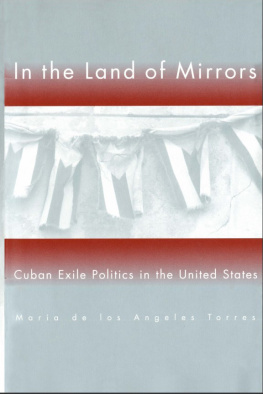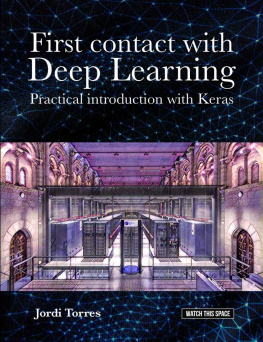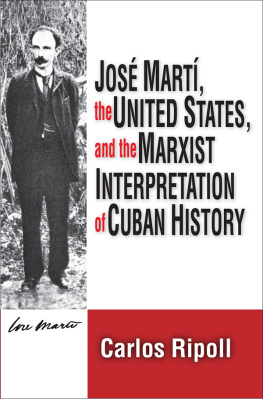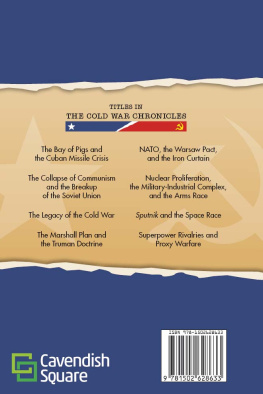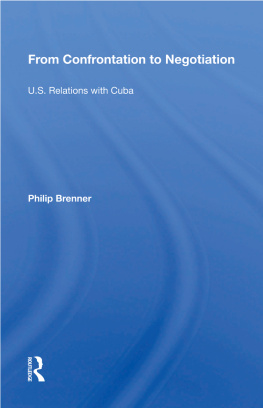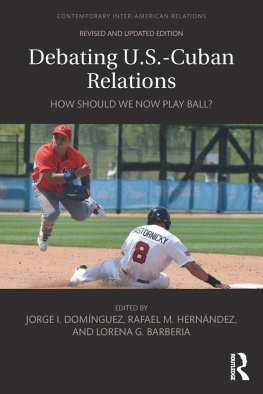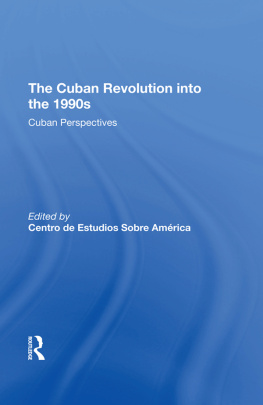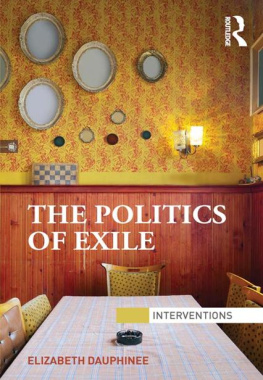Torres - In the Land of Mirrors: Cuban Exile Politics in the United States
Here you can read online Torres - In the Land of Mirrors: Cuban Exile Politics in the United States full text of the book (entire story) in english for free. Download pdf and epub, get meaning, cover and reviews about this ebook. publisher: University of Michigan Press, genre: Politics. Description of the work, (preface) as well as reviews are available. Best literature library LitArk.com created for fans of good reading and offers a wide selection of genres:
Romance novel
Science fiction
Adventure
Detective
Science
History
Home and family
Prose
Art
Politics
Computer
Non-fiction
Religion
Business
Children
Humor
Choose a favorite category and find really read worthwhile books. Enjoy immersion in the world of imagination, feel the emotions of the characters or learn something new for yourself, make an fascinating discovery.
- Book:In the Land of Mirrors: Cuban Exile Politics in the United States
- Author:
- Publisher:University of Michigan Press
- Genre:
- Rating:3 / 5
- Favourites:Add to favourites
- Your mark:
- 60
- 1
- 2
- 3
- 4
- 5
In the Land of Mirrors: Cuban Exile Politics in the United States: summary, description and annotation
We offer to read an annotation, description, summary or preface (depends on what the author of the book "In the Land of Mirrors: Cuban Exile Politics in the United States" wrote himself). If you haven't found the necessary information about the book — write in the comments, we will try to find it.
Torres: author's other books
Who wrote In the Land of Mirrors: Cuban Exile Politics in the United States? Find out the surname, the name of the author of the book and a list of all author's works by series.
In the Land of Mirrors: Cuban Exile Politics in the United States — read online for free the complete book (whole text) full work
Below is the text of the book, divided by pages. System saving the place of the last page read, allows you to conveniently read the book "In the Land of Mirrors: Cuban Exile Politics in the United States" online for free, without having to search again every time where you left off. Put a bookmark, and you can go to the page where you finished reading at any time.
Font size:
Interval:
Bookmark:

First paperback edition 2001
Copyright by the University of Michigan 1999
All rights reserved
Published in the United States of America by
The University of Michigan Press
Manufactured in the United States of America Printed on acid-free paper
Printed on acid-free paper
2010 2009 2008 2007 6 5 4 3
No part of this publication may be reproduced, stored in a retrieval system, or transmitted in any form or by any means, electronic, mechanical, or otherwise, without the written permission of the publisher.
A CIP catalog record for this book is available from the British Library.
Library of Congress Cataloging-in-Publication Data
Torres, Mara de los Angeles.
In the land of mirrors : Cuban exile politics in the United States / Mara de los Angeles Torres.
p. cm.
Includes bibliographical references and index.
ISBN 0-472-11021-7 (alk. paper)
1. Cuban Americans Politics and government. 2. CubansUnited States Politics and government. I. Title.
E184.C97T67 1999
324'.089'687294073dc21 99-36965
CIP
ISBN 0-472-08788-6 (pbk. : alk. paper)
ISBN 978-0-472-11021-6 (alk. paper)
ISBN 978-0-472-08788-4 (pbk. : alk. paper)
ISBN13 978-0-472-08788-4 (paper)
ISBN13 978-0-472-02729-3 (electronic)
In memory of Lourdes Casal, who built the bridge,
and Eliseo Diego, who opened the door.
For my daughters,
Alejandra Mara and Paola Camila Piers-Torres
may they relish their multiple heritage.
Definitin
Exilio
es vivir donde no existe casa alguna
en la que hayamos sido nios;
donde no hay ratas en los patios
ni almidonadas solteronas
tejiendo tras las celosias
Definition
Exile is to live where no house exists
in which we have been children:
where there are no rats in the patio
or unmarried women in starched clothing
knitting behind a trellis
Lourdes Casal. Palabras Juntan Revolucion (1981)
El Espejo
Est dormido el espejo
en la noche de verano.
Las sillas. la mesa, el piano,
dan un livido reflejo
como en los suenos de un viejo
las memorias de otros anos.
Y el hilo
que va en los panos
iluminando el misterio,
es el rojo faro I serio
del tren distante y extrano.
The Mirror
The mirror is sleeping
on a summer evening.
The chairs, the table, the piano,
give off a livid reflection
like the dreams of an old man
the memories of other years.
And the thread that goes through the tapestry
illuminating the mystery,
is the serious red lantern
of the distant and foreign train.
Eliseo Dieeo, Nombrar las Cosas (1973)
Illustrations
Entre Miami y La Habana/
Between Miami and Havana
Eduardo Aparicio
The portfolio of diptychs in this volume combines images of Cuba (mostly of Havana, taken during my first return visit, in February 1994), and images of the Miami area. The presentation aims to be neither binary nor hierarchical, but rather to invite the viewer to see them as multiple versions of a shared reality. The task of determining at a quick glance what side of the Strait of Florida each image was taken is challenged.
Instead of reinforcing contrasts, these diptychs point to the similarities in two realities that are generally considered opposites. These images question the currency of our national fetishes (the flag, the map of Cuba, the image of Jos Marti, the image of Che Guevara, the Cuban royal palm) at a time of a paradigmatic shift in the conceptualization of Cuban nationhood, while evidencing the erosion and deterioration of Cuban national iconography, both in Cuba and in Miami.
The first public exhibition of these diptychs was in September 1996, at the gallery Espacio Aglutinador in Havana, curated by Sandra Ceballos.
Eduardo Aparicio (b. Guanabacoa, Cuba, 1956) is a photographer and writer. He has lived in Miami since 1994.
Tables
Preface
I was born in Cuba and sent to the United States at the age of six. I was one of the fourteen thousand unaccompanied children who came as part of what became known as Operation Pedro Pan. Like half of these children, I was reunited with my parents within months. Also like many other Cuban families who came to the United States in the early 1960s, we were relocated to Cleveland, Ohio. Raised outside the closely knit Miami migr enclave, I was not protected from dehumanizing clashes with racism. These contributed to my search for alternative politics and my desire to return home. In the late 1960s and early 1970s I began to meet other Cuban exiles who, like myself, wanted to engage with our homeland. While we were a relatively small group, we managed to find our way back. The Cuban revolution seemed to offer an alternative to the social injustices we were witnessing in the United States. Yet, after years of returning to the island, I became aware of the corruption and abuses of the Cuban governmentthus, the search for a perspective that could be critical of both governments. Each stage along the way has involved considerable emotional, political, and intellectual struggle. This book explores these journeys.
My intellectual journey began as a graduate student at the University of Michigan. Lourdes Casal first suggested that I study Cuban exile politics. The chair of the department, however, asked why I would choose such an insignificant voting group. I persisted, despite the graduate program directors concerns about whether or not a Cuban exile could be objective in studying exiles. I do not hide the fact that my perspectives are informed and shaped by events that occurred in my homeland when I was young. My experiences of leaving Cuba in the early 1960s and growing up in the United States at a time of social and political upheaval have greatly marked my views as well. Other waves of Cuban exiles have arrived since the 1960s. My experiences differ from theirs in many ways. Yet there have been similarities in our dislocations; after all, the island has been ruled by one person for four decades, and U.S. policies toward Cuba have been hostile throughout this time.
Although I share points of reference with other Cuban exiles, particularly of my generation, my views are my own. I question the validity of
Still. I am reluctant to give up the quest for theorizing. After all, there may be conceptual tools that can help us understand differences instead of simply generalizing and consequently diluting and distorting experiences. I would add that what has driven me to observe and participate, and what has in the process changed me as well, has been my commitment to engage in an intellectual struggle particularly around issues that contribute to defining who is entitled to participate in politics.
My method of inquiry is eclectic. Over the past ten years I have systematically interviewed key political actors in the exile community and in Cuba. I have also extensively reviewed government documents available in various libraries as well as those obtained through freedom of information requests. And I have taken notes of my personal involvement in the various political movements referred to throughout the book.
The introduction that follows places this work at the intersection of the personal and the political. presents the theoretical concerns of the book. The need for a more comprehensive theoretical and political perspective has grown more urgent in light of the restructuring of the international political economy. Regional blocs such as the European Union and the North American Free Trade Agreement transcend predetermined political borders. The boundaries of the nation-state no longer define peoples work or life experiences as rigidly as they did during most of the twentieth century. These developments call for new paradigms that explore the changing nature of borders. As such, I situate this study within the broader inquiry of the changing nature of nation-states and its impact on the politics and identity of diaspora communities.
Font size:
Interval:
Bookmark:
Similar books «In the Land of Mirrors: Cuban Exile Politics in the United States»
Look at similar books to In the Land of Mirrors: Cuban Exile Politics in the United States. We have selected literature similar in name and meaning in the hope of providing readers with more options to find new, interesting, not yet read works.
Discussion, reviews of the book In the Land of Mirrors: Cuban Exile Politics in the United States and just readers' own opinions. Leave your comments, write what you think about the work, its meaning or the main characters. Specify what exactly you liked and what you didn't like, and why you think so.

